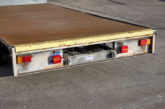
Research has revealed motoring trade and repair firms face some of the longest payment delays of any UK industry.
This comes as the government has announced a landmark crackdown on late payments, as part of the Small Business Plan, offering hope to firms in the sector.
The business finance experts at money.co.uk, analysed data from the Department for Business and Trade to reveal the worst-affected industries and offer their tips to tackle the issue.
The UK industries that wait the longest to be paid:
| Rank | Industry* | Median days to pay large businesses |
| 1 | Manufacturing | 47 |
| 2 | Wholesale and retail trade; repair of motor vehicles and motorcycles | 36 |
| 2 | Agriculture, forestry and fishing | 36 |
| 2 | Water supply; sewage, waste management and remediation activities | 36 |
| 5 | Accommodation and food services activities | 35 |
| 6 | Transportation and storage | 34 |
| 7 | Construction | 33 |
| 8 | Mining and quarrying | 32 |
| 9 | Professional, scientific and technical activities | 31 |
| 10 | Arts, entertainment and recreation | 30 |
| 10 | Real estate activities | 30 |
| 10 | Information and communication | 30 |
| 13 | Administrative and support service activities | 28 |
| 14 | Human health and social work activities | 27 |
| 15 | Electricity, gas, steam and air conditioning supply | 26 |
| 16 | Education | 25 |
| 17 | Financial and insurance activities | 22 |
| [*The “Other services activities” sector has been removed.] | ||
The wholesale and retail motor trade sector, including the repair of motor vehicles and motorcycles, ranks joint-second compared to other industries for late payments, with a median wait of 36 days.
The standard for payment obligations for customers and businesses in the UK is typically within 30 days of getting invoiced or receiving goods unless a different date is agreed upon.
According to research by the Department of Business and Trade, over half (54%) of UK businesses contractually agree to this timeline.
Joe Phelan, money.co.uk expert, offers his tips for handling late payments: “While overdue invoices might feel like an inevitable part of running a business, there are ways to mitigate their impact. By adopting proactive measures and leveraging financial tools, SMEs can build resilience and protect their operations from the risks associated with late payments.
“Using a business credit card effectively, for example, can be a lifesaver when payment schedules don’t align. The key to this is thinking of the card as a short-term buffer rather than a long-term crutch.
“Start by choosing a credit card that offers longer grace periods – some providers do this for new customers. You should also look for cards that provide zero or a reduced introductory APR, especially if you anticipate carrying a balance from time to time. And, if they offer cashback or rewards, that is even better, as this can offset some of your expenses.
“Timing can be everything, so align your credit card payments with your income schedule as best as possible. For example, if you’re typically paid mid-month, set the card payment to be due later in the month to avoid late fees.
“Lastly, remain disciplined and make sure to pay off the balance in full wherever possible. It’s well known that credit cards can accrue interest very quickly, depending on your interest rates. It’s also better to use accounting software to manage these payments, as manual methods can lead to human error. And remember, a credit card should supplement your business’s financial plan, not replace it.”









